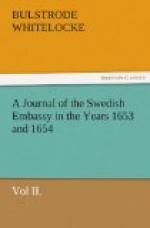[193] [No sooner had Cromwell assumed the Protectorate than his foreign policy took a more definite shape, and was steadily directed to two great objects—peace with Holland, and the union of the Protestant States. The conclusion of the Dutch peace was however not an easy matter. Cromwell himself had declared in favour of the daring project of a union of the two Republics, and the Dutch alliance was hated by many of his stoutest military supporters. Moreover he required of the Dutch, as a condition sine qua non, that they should engage never to make the young Prince of Orange or his descendants their Stadtholder, or to give him the command of their forces. This was the secret article against which the States General most vehemently protested, and Cromwell was at length obliged to content himself with an engagement of the province of Holland to exclude the House of Orange. Even this pretension was strongly opposed by De Witt, but Cromwell insisted. The public treaty of peace was signed on the 5th of April, 1654; but it was not until the 5th of June following that the secret article was ratified. The King of Denmark, the Swiss Protestant cantons, the Hanseatic towns, and some of the Protestant Princes of North Germany were included in the treaty, which formed the complement of the negotiation on which Whitelocke was engaged in Sweden.—M. GUIZOT, Histoire de la Republique d’Angleterre, vol. ii. p. 67.]
[200] “We, Christina, by the grace of God Queen of the Swedes, Goths, and Vandals, etc., do make known and testify that whereas the endeavours of the illustrious and generous, of us sincerely beloved, the Lord Bulstrode Whitelocke, Extraordinary Ambassador, are most grateful to us, which he hath negotiated for the common good of our Kingdom and his Commonwealth, for the making of a league of stricter friendship between both parties: therefore, and to the end it may appear as a testimony of our goodwill and grateful memory on this behalf, we have thereupon granted and assigned, and by these our letters do grant and assign to the said Lord Ambassador two hundred pound of copper, commonly called ship-pounds; the which two hundred pounds of copper our treasurers and officers of our Chamber of Accounts are obliged, without delay, to deliver into the hands of the before-mentioned Ambassador. In greater testimony whereof we have commanded these presents, subscribed with our hand, to be confirmed by our seal. Given in our castle of Upsal, the 3rd day of May, in the year 1654. CHRISTINA.”




